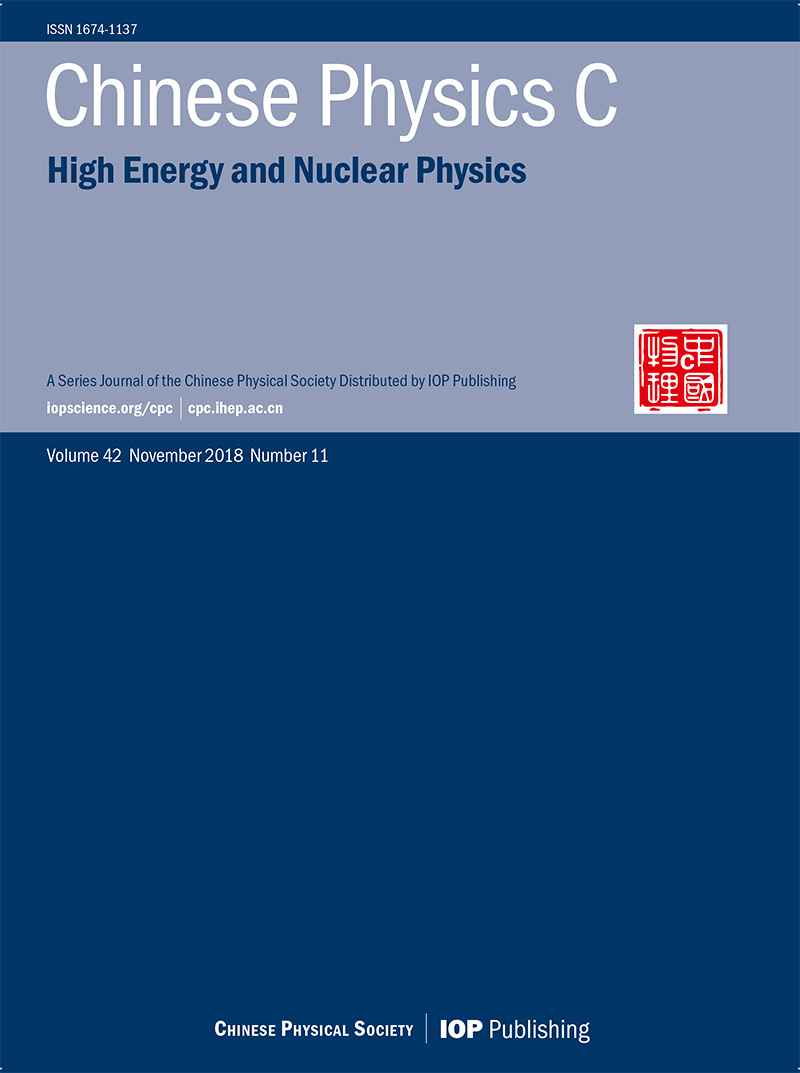1993 Vol. 17, No. S1
Display Method: |
Abstract:
The projectile-like fragments (PLF) emitted at forward angles in 46.7 MeV/u 12C induced reactions on different target nuclei have been measured. It was found the most probable energies of PLF products can be interpreted in the framework of an Abrasion model. The longitudinal momentum distribution widths fulfill the Goldhaber formula, and the reduced longitudinal momentum distribution width, extracted from the experiment σ0 is 80±10 MeV/c, which is close to the value obtained in relativistic energy region. After averaging over many fragments, the σ0 is nearly the same for different systems studied.
The projectile-like fragments (PLF) emitted at forward angles in 46.7 MeV/u 12C induced reactions on different target nuclei have been measured. It was found the most probable energies of PLF products can be interpreted in the framework of an Abrasion model. The longitudinal momentum distribution widths fulfill the Goldhaber formula, and the reduced longitudinal momentum distribution width, extracted from the experiment σ0 is 80±10 MeV/c, which is close to the value obtained in relativistic energy region. After averaging over many fragments, the σ0 is nearly the same for different systems studied.
Abstract:
The spectra and the decay times of a series of Ce3+-doped BaF2 crystals have been measured. The results demonstrate that a BaF2 with a proper amount of Ce3+ doped have outstanding advantages:the emission spectra shift from LTV band towards blue band, a near blue fluorescence with quite fast decay time (80 ns) replaces the slow component (~600 ns) and very fast one (~0.8 ns) of undoped BaF2. The intensity of the new component is comparable with the sum of the odd ones.
The spectra and the decay times of a series of Ce3+-doped BaF2 crystals have been measured. The results demonstrate that a BaF2 with a proper amount of Ce3+ doped have outstanding advantages:the emission spectra shift from LTV band towards blue band, a near blue fluorescence with quite fast decay time (80 ns) replaces the slow component (~600 ns) and very fast one (~0.8 ns) of undoped BaF2. The intensity of the new component is comparable with the sum of the odd ones.
Abstract:
The experiment results from the light particle correlation measurement obtained in 12C(46.7 MeV/u) + 58Ni reaction by using a 9-element CsI(Tl) hodoscope are reported. The definition of the correlation function and its extraction method from the experimental data are discussed in detail. In this paper, the decay of the unstable particles is studied. The correlation functions of various particle combination on 58Ni target are given.
The experiment results from the light particle correlation measurement obtained in 12C(46.7 MeV/u) + 58Ni reaction by using a 9-element CsI(Tl) hodoscope are reported. The definition of the correlation function and its extraction method from the experimental data are discussed in detail. In this paper, the decay of the unstable particles is studied. The correlation functions of various particle combination on 58Ni target are given.
Abstract:
The energies of γ-rays from some nuclides around 500 keV have been measured by a slithering comparison with the precisely known γ-energies of 192Ir. The energies determined by this method are:477603.18±0.44 eV for 7Be, 511852.70±0.58 eV for 106Ru, 514004.87±0.52 eV for 85Sr, 520399.01±0.63 eV for 83Rb, 529594.48±0.69 eV for 83Rb and 552551.14±0.68 eV for 83Rb. Recalculate the result of a previous experiment by using the new energy measurement, the value of electron mass is obtained as 510998.6±1.1 eV which is in good agreement with the recently adjusted value of electron mass.
The energies of γ-rays from some nuclides around 500 keV have been measured by a slithering comparison with the precisely known γ-energies of 192Ir. The energies determined by this method are:477603.18±0.44 eV for 7Be, 511852.70±0.58 eV for 106Ru, 514004.87±0.52 eV for 85Sr, 520399.01±0.63 eV for 83Rb, 529594.48±0.69 eV for 83Rb and 552551.14±0.68 eV for 83Rb. Recalculate the result of a previous experiment by using the new energy measurement, the value of electron mass is obtained as 510998.6±1.1 eV which is in good agreement with the recently adjusted value of electron mass.
Abstract:
The monoenergetic slow positron beam was first used to study the crystallization process of metallic glasses. The measurement of Doppler broadening spectra as a function of positron beam energy was performed on the samples of the metallic glass Pd79.5Ni4Si16.5 with various states (i.e., the as-quenched state, structural relaxation states and crystalline states). It is shown that there are a great number of the vacancy-type defects in the as-quenched state sample. Its crystallization process starts at the sample surfaces. The present research indicates that the slow positron annihilation spectroscopy (SPAS) is one of most effective methods for studying the crystallization process of metallic glasses.
The monoenergetic slow positron beam was first used to study the crystallization process of metallic glasses. The measurement of Doppler broadening spectra as a function of positron beam energy was performed on the samples of the metallic glass Pd79.5Ni4Si16.5 with various states (i.e., the as-quenched state, structural relaxation states and crystalline states). It is shown that there are a great number of the vacancy-type defects in the as-quenched state sample. Its crystallization process starts at the sample surfaces. The present research indicates that the slow positron annihilation spectroscopy (SPAS) is one of most effective methods for studying the crystallization process of metallic glasses.
Abstract:
In this paper, the transport of charged particle beams in nonlinear periodic fields is studied. By means of mapping technique the emittance plots of beams matched to the nonlinear periodic fields can be obtained. The variance of emittance plots and the beam envelopes are periodic, and their periods are equal to the period of the field.
In this paper, the transport of charged particle beams in nonlinear periodic fields is studied. By means of mapping technique the emittance plots of beams matched to the nonlinear periodic fields can be obtained. The variance of emittance plots and the beam envelopes are periodic, and their periods are equal to the period of the field.
Abstract:
The phase structure of 3-dimensional SU/(2) lattice gauge theory is studied by using variational method with an independent plaquette trial action. The mean-plaquette internal energy Ep~β curve is smooth, which shows only one confining phase, and is better than that given by independent link trial action.
The phase structure of 3-dimensional SU/(2) lattice gauge theory is studied by using variational method with an independent plaquette trial action. The mean-plaquette internal energy Ep~β curve is smooth, which shows only one confining phase, and is better than that given by independent link trial action.
Abstract:
Based on the quark production rule and quark combination rule, the average yields of long-lived charged particles and average charged multiplicities in high energy e+e- annihilation have been studied. The calculated yields of hadrons, average charged multiplicities and their energy dependences are all consistent with the available data.
Based on the quark production rule and quark combination rule, the average yields of long-lived charged particles and average charged multiplicities in high energy e+e- annihilation have been studied. The calculated yields of hadrons, average charged multiplicities and their energy dependences are all consistent with the available data.
Abstract:
The dressing transformations of the basic fields and the classical chiral operators in the bosonic superconformal Toda theory are analyzed, starting from the r-matrix formulation of this model. After quantization, we obtain the corresponding quantum dressing group.
The dressing transformations of the basic fields and the classical chiral operators in the bosonic superconformal Toda theory are analyzed, starting from the r-matrix formulation of this model. After quantization, we obtain the corresponding quantum dressing group.
Abstract:
The coexistence and competition between fragmentation and transfer in the 46.7 MeV/u 12C induced reactions have been discussed. The reduced longitudinal momentum distribution width for the transfer reaction, extracted from our experiment, is 44±10 MeV/c, which is smaller than that for the fragmentation (80±10 MeV/c). The probabilities for both the projectile fragmentation and the transfer processes are observed to be dependent on the structure of the transferred cluster.
The coexistence and competition between fragmentation and transfer in the 46.7 MeV/u 12C induced reactions have been discussed. The reduced longitudinal momentum distribution width for the transfer reaction, extracted from our experiment, is 44±10 MeV/c, which is smaller than that for the fragmentation (80±10 MeV/c). The probabilities for both the projectile fragmentation and the transfer processes are observed to be dependent on the structure of the transferred cluster.
Abstract:
The influence of the parameters of the relativistic optical potential on the nucleon scattering properties, such as cross sections, angular distributions and spin observables etc., is studied based on a set of global Dirac phenomenological optical potential. It is shown that, in contrast with the case at low energies, the total scattering cross sections vary slowly with the energy and depend weakly on the potentials at Ep <300 MeV. The differential cross sections and spin observables depend not only on the volume integrals of the optical potentials, but also on their strengths and shapes. The applicability of the relativistic microscopic optical potential based on the Walecka model in the medium energy region is also discussed in this paper.
The influence of the parameters of the relativistic optical potential on the nucleon scattering properties, such as cross sections, angular distributions and spin observables etc., is studied based on a set of global Dirac phenomenological optical potential. It is shown that, in contrast with the case at low energies, the total scattering cross sections vary slowly with the energy and depend weakly on the potentials at Ep <300 MeV. The differential cross sections and spin observables depend not only on the volume integrals of the optical potentials, but also on their strengths and shapes. The applicability of the relativistic microscopic optical potential based on the Walecka model in the medium energy region is also discussed in this paper.
Abstract:
The space-time development of the energy density reached in relativistic heavy ion collisions is analyzed based on the Monte Carlo code ODEN. The results show that the actually reached energy density is considerably lower than Bjorken's estimation due to the finite collision time.
The space-time development of the energy density reached in relativistic heavy ion collisions is analyzed based on the Monte Carlo code ODEN. The results show that the actually reached energy density is considerably lower than Bjorken's estimation due to the finite collision time.
ISSN 1674-1137 CN 11-5641/O4
Original research articles, Ietters and reviews Covering theory and experiments in the fieids of
- Particle physics
- Nuclear physics
- Particle and nuclear astrophysics
- Cosmology
Author benefits
- A SCOAP3 participating journal - free Open Access publication for qualifying articles
- Average 24 days to first decision
- Fast-track publication for selected articles
- Subscriptions at over 3000 institutions worldwide
- Free English editing on all accepted articles
News
- CPC Announces 2025 Outstanding Reviewers
- Chinese Physics C Outstanding Reviewer Award 2023
- Impact factor of Chinese Physics C is 3.6 in 2022
- 2022 CPC Outstanding Reviewer Awards
- The 2023 Chinese New Year-Office closure
Cover Story
- Cover Story (Issue 2, 2026) |The images of Brans-Dicke-Kerr type naked singularities
- Cover Story (Issue 1, 2026) A focused review of quintom cosmology: from quintom dark energy to quintom bounce
- Cover Story (Issue 11, 2025) The Earth-Magnet Assists DAMPE in Studying Cosmic Anti-Electrons
- Cover Story (Issue 9, 2025): Precise measurement of Ïc0 resonance parameters and branching fractions of Ïc0,c2âÏï¼Ïï¼/ K+K-
- Cover Story (Issue 8, 2025) A Novel Perspective on Spacetime Perturbations: Bridging Riemannian and Teleparallel Frameworks












